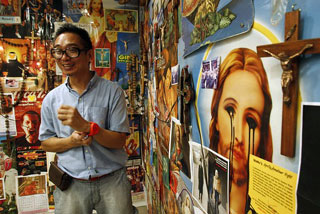Accused of being blasphemous in 2011, the controversial artwork "Poleteismo" has been ruled not obscene by Ombudsman Conchita Carpio-Morales, who also dismissed the complaints against artist Mideo Cruz and ten officials of the Cultural Center of the Philippines (CCP). According to a statement from the Office of the Ombudsman released Monday, "The Office ruled that Poleteismo does not fall under 'obscene' exhibitions. "It held that otherwise censoring offensive artworks is a form of prior restraint generally prohibited by the Constitution, there being no showing that it falls under the limited exceptions where an expression (e.g. pornography) may be subject to prior restraint," the statement said. "Applying jurisprudence, it ruled that the artwork neither depicts, in a patently offensive way, sexual conduct nor appeals to the prurient interest. Nor was it found to be lacking in serious literary, artistic, political or scientific value as to remove it from the ambit of constitutionally protected expression," the statement added.

Mideo Cruz and his controversial artwork "Poleteismo." Reuters
"Poloteismo" was one of the artworks in the Kulo exhibit, which opened at the CCP Main Gallery on June 17, 2011. The exhibit was scheduled to run until August 21, but was
closed prematurely due to vandalism and "threats to persons and property." The artwork is a mixed-media collage of both religious and cultural icons. The more controversial parts of the collage juxtaposed religious images with condoms and replicas of male genitalia.
In August 2011, Cruz and the CCP officials faced criminal complaints that accused them of violating Article 201 of the Revised Penal Code on obscene exhibitions and indecent shows. The ten CCP officials--Emily Abrera, Raul Sunico, Florangel Rosario-Braid, Jaime Laya, Isabel Caro Wilson, Zenaida Tantoco, Maria Cristina Turalba, Antonio Yap, Carolyn Espiritu, and Karen Ocampo Flores--also faced
administrative complaints for allegedly violating the Code of Conduct and Ethical Standard for Public Officials and Employees (R.A. 6713). Abrera and Sunico were also charged with grave misconduct and conduct unbecoming of a public officer.
But according to the statement, in a joint resolution and joint decision both signed on Feb. 28, "Ombudsman Conchita Carpio-Morales found neither probable cause to indict respondents nor substantial evidence to hold them administratively liable, respectively." The joint resolution said that the artwork does not violate paragraph 2 of article 201 of the Revised Penal Code, because this only applies to live shows or moving images. According to the statement, "[The resolution] added that the medium used in Poleteismo may be covered by paragraph 3 of article 201 (e.g., films, prints, engravings, sculpture or literature) but to constitute a violation thereof it must be offensive to morals and not merely offensive to religion." The resolution said the artwork was intended primarily for people interested in art, and meant to provoke discussion on modern-day idolatry. It also found that the exhibit was not for profit since the artworks were not for sale and admission to the exhibit was free. The resolution noted that the artwork was placed at the far end of the exhibit, which also had an advisory that some artwork may not be viewable by minors. "Poleteismo" was also accompanied by an explanatory text, the ruling said. As for the administrative complaints against the CCP officials, the joint decision said that as the officials were not legally bound to prohibit the exhibit, and there was no clear intent to violate the law, there can be no grave misconduct on their part.
— Amanda Lago/DVM, GMA News 




